 Some stuff came out of the IPO today about copyright: here and here. The UK government's current temporary IP stand-in, David Lammy (pictured right, and apparently in some pain; did someone electrify the lectern?), wants to have a "debate" about where copyright is going by issuing a "wide ranging consultation [...] on the future of copyright". The consultation document, available here (pdf), makes for some quite dull reading (although it is mercifully brief), as it doesn't really say anything of substance. What it does say is the usual guff about "creative industries" being important to the UK economy in the 21st century. What it doesn't say is why these creative industries need copyright terms that will, in many cases, last well into the 22nd century.
Some stuff came out of the IPO today about copyright: here and here. The UK government's current temporary IP stand-in, David Lammy (pictured right, and apparently in some pain; did someone electrify the lectern?), wants to have a "debate" about where copyright is going by issuing a "wide ranging consultation [...] on the future of copyright". The consultation document, available here (pdf), makes for some quite dull reading (although it is mercifully brief), as it doesn't really say anything of substance. What it does say is the usual guff about "creative industries" being important to the UK economy in the 21st century. What it doesn't say is why these creative industries need copyright terms that will, in many cases, last well into the 22nd century.For anyone still interested, the consultation identifies four areas for debate:
1. Access to works: Is the current system too complex, in particular in relation to the licensing of rights, rights clearance and copyright exceptions? [IPKat answer: a very big YES; just look at the state of the CDPA 1988] Does the legal enforcement framework work in the digital age? [IPKat answer: oh yes: just ask Davenport Lyons; the correct question should instead be whether this is a good thing]Go ahead and speak your brains, if you must. This Kat is going to have a lie down...
2. Incentivising investment and creativity: Does the current copyright system provide the right incentives to sustain investment and support creativity? [IPKat answer: incentives, yes; the right incentives: no] Is this true for both creative artists and commercial rights holders? [IPKat answer: creative artists are always expoited by commercial rights holders, who always get the better deal; changing copyright law is not going to change this commercial reality] Is this true for physical and online exploitation? Are those who gain value from content paying for it? [How does one 'gain value from content'? Was this inserted by the BPI?]
3. Recognising creative input: Does the current system provide the right balance between commercial certainty and the rights of creators and creative artist[s]?[IPKat answer: no, obviously] Are creative artists sufficiently rewarded/ protected through their existing rights? [IPKat answer: some are, some aren't; why should copyright law care? Why would any more rights affect this?]
4. Authenticating works: What action, if any, is needed to address issues related to authentication? [IPKat comment: eh?] In considering the rights of creative artists and other rights holders is there a case for differentiation? [IPKat comment: what is this nonsense about?]
 Reviewed by David Pearce
on
Tuesday, December 16, 2008
Rating:
Reviewed by David Pearce
on
Tuesday, December 16, 2008
Rating:





![[GuestPost] G1/24: Tuning in! A take on the state of proceedings before oral proceedings](https://blogger.googleusercontent.com/img/b/R29vZ2xl/AVvXsEjZhEivE5bp7QOwZsyZXAXbVNYSmLjUthkB2Q7fm1_dpB97u5lIQeyWT9ZadUTAH3Z-hXn13VpW4vBDRPx9emCnoDV6tbUTkyvfmqPv1nNInL8XMdrAtSZ2hcRQr2LjxKovC9wTk_XyZxQ0CtX1MUrO_Muz3OJ4ld8AftymsdUmKD7xNksYMwk6/s150/Picture%201.png)
![[Guest post] ‘Ghiblification’ and the Moral Wrongs of U.S. Copyright Law](https://blogger.googleusercontent.com/img/b/R29vZ2xl/AVvXsEhxl1BQBAW3Y-asjb1xXB9eA4DYy77fky6WgR-prC-_6DeBbDqOgCUDWyiz0Q3B23MWWAXnkbS2H2js7OUwA0JQXAHmsyVFgGIHeJz7zJ791vTzOD-4SJqWFIuywFXQyd3ahybbdZd4e8IEVfcNqctvyR8lumv_Gix6Tsw5cSvbHpTI1nwvztDuAQ/s150/IMG_2179.HEIC)



![[Guest book review] The Handbook of Fashion Law (with a discount code)](https://blogger.googleusercontent.com/img/b/R29vZ2xl/AVvXsEgB4h2AdqJKwq9O3Ft4Mb7C39tv_NeFpkzrOfvhIsuwAkM_ops2Hgj7fdwzq_TQsjQDvQrQa-yyC9Q9pNiugseXRlUaMdsr_cmYUbh9lH8HDECMCbsTuNboVgpafyEhkgDkVS6ruHkuz8Sx0QVGI_1S8R9kbsHdNIYrRjqhyphenhyphen010_txjJUYvlZOtWA/s150/Fashion%20Law%20Book%20Bicture.jpg)






Nonsense is the word when it comes for the 4th question.
ReplyDeleteJust read this:
"Nor does it [the copyright system] require that works are of a certain quality or are commercial in nature...A personal blog attracts the same protection as the works of a best selling author. Does this approach continue to provide the best framework for copyright in the digital age?"
Is the government seriously thinking of introducing a quality test for copyright protection? This is dangerous stuff.
I previously suspected that Mr Lammy knew very little about IP. My suspicions seem to have been confirmed. What is the point of issuing a 'consultation' on questions relating to fundamental issues of copyright when you don't know, let alone understand, the fundamentals already in existence? Did he even read the Gowers report before spewing forth this nonsense?
ReplyDeleteHmm, the quality control is really a bit a scary. All other concerns aside, would introducing a quality test not stifle creativity more than anything else? I thought the days when governments were debating such things were long gone. I wonder whether this has all been thought up rather too quickly...
ReplyDeleteI can only speak for Germany, but there we would have some constitutional issue if the government (and/or courts) wanted to make quality judgments on what should be protectable under copyright laws.
Very confusing....